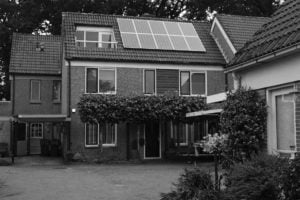Een Toolbox voor Aardgasvrije Wijken
08 02 2021English version below: Roadmap to gas-free neighbourhoods
Tijdens de aflopende regeerperiode heeft het Nederlandse kabinet het historische besluit genomen om gefaseerd de gaswinning in Groningen te beëindigen. Doordat het leeuwendeel van de Nederlandse woningvoorraad is aangesloten op het gasnetwerk, staan we voor een grote opgave. In opdracht van het Ministerie van Binnenlandse Zaken en Koninkrijksrelaties ontwikkelden Springco en Rebel een toolbox die gemeenten kunnen gebruiken om te bepalen in welke wijk zij deze warmtetransitie beginnen.
Deze toolbox maakte onderdeel uit van het Programma Aardgasvrije Wijken, opgezet door BZK en de RVO. Gemeenten zijn essentieel in de warmtetransitie, omdat zij de uitvoering grotendeels voor hun rekening nemen. Niet alleen betekent dit dat zij bepalen welke wijk als eerst van het gas af gaat, maar zij zorgen ook voor een geschikte communicatie- en participatiestrategie. In tegenstelling tot andere projecten, waarop wij de nieuwste analysetechnieken loslaten, leverden wij hier een raamwerk op waar gemeenten gebruik van kunnen maken tijdens dit proces.

Een woning in Nunspeet (Gelderland) met zonnepanelen op het dak
Relevante variabelen
Om ervoor te zorgen dat alle wijken goed in beeld worden gebracht, adviseren wij gemeentes om zowel subjectieve als objectieve variabelen op een rijtje te zetten. Subjectieve data kunnen worden verzameld door middel van surveys en vervolgens worden gekwantificeerd. Objectieve data kunnen bij een databedrijf als Springco worden opgehaald, in combinatie met publieke databases als CBS, BAG, BRP, UWV en DUO. Daarnaast zitten gemeenten vaak op een schat van data. Denk aan gemeentelijke verslagen, infrastructurele bouwgegevens en huishoudkenmerken.
Duurzaamheidsattitudes
De complete dataset faciliteert een scala aan mogelijkheden en kan bijvoorbeeld worden gebruikt om duurzaamheidsattitudes van de gemeente te voorspellen. Deze analyse van Springco illustreert de bereidheid van huiseigenaren en huurders om te ‘investeren’ in hun huis. Door samen te werken met gemeenten, woningcorporaties en ondernemingen, waren wij in staat om dit voor heel Nederland in kaart te brengen met een Principal Component Analysis. Deze methode heeft het potentieel complexe zaken in een simpele score te vertalen. Daarbij maakten wij gebruik van een multinomiaal logistische regressiemodel, een neuraal netwerk en onze database. Deze scores zijn vervolgens uitgebreid gevalideerd met kennispartners.

Het raamwerk beschrijft de stappen die gemeenten moeten nemen om een strategie voor aardgasvrije wijken op te stellen
Communicatie- en participatiestrategie
Welke methode een gemeente ook gebruikt, uiteindelijk wordt een eerste wijk gekozen. De volgende stap is dan om een slimme communicatie- en participatiestrategie vorm te geven die past bij de lokale context. Sommige bewoners willen vanaf het begin meedenken en hebben veel ideeën hoe de warmtetransitie in hun omgeving vorm moet krijgen, terwijl andere bewoners liever een panklare route uitgestippeld door experts zien. Dit is sterk afhankelijk van de leefstijl van een bewoner, die Springco en Rebel in samenwerking met DISCVision in beeld kunnen brengen. Op deze manier kan een effectieve strategie gestalte krijgen, die voorschrijft wanneer, hoe en wat de gemeente communiceert naar haar bewoners.

DISCVision ontwikkelde acht leefstijlen, met uiteenlopende voorkeuren voor de manier van communicatie en participati
Deze transitie naar hernieuwbare energiebronnen is eerder een marathon dan een sprint, en wij begeleiden gemeenten maar al te graag in deze tocht. Samen met onze partner Rebel ontwikkelen wij voor verschillende steden en dorpen visiedocumenten op het gebied van de warmtetransitie. Schroom niet collega Tijn Croon te benaderen bij vragen: croon@spring-co.nl.
Roadmap to gas-free neighbourhoods
During its last term, the Dutch Cabinet decided to phase-out gas extraction in the northern province of Groningen, as the production continuously induced earthquakes and caused damage to buildings. Since the lion’s share of Dutch houses depends on the gas grid when it comes to energy supply, decoupling them represents a major challenge. On behalf of the Interior Ministry, Springco and Rebel created a toolbox for the selection of relevant neighbourhoods to start this transition.
The toolbox was part of the ‘Programma Aardgasvrije Wijken’, set up by the Dutch Interior Ministry and Enterprise Agency, and was mainly focused on municipalities. Municipalities are part and parcel of the gas transition, as they are closest to residents. They not only select the neighbourhoods that are decoupled first, but also take care of a communication and participation strategy that suits the local context. Rather than providing a state-of-the-art data analysis (which we love to do in other projects) we proposed a framework with several steps municipalities could take during this process.

A home in Nunspeet (Gelderland) with solar panels on its roof
Relevant variables
In order to consider all neighbourhoods prudently, municipalities should take into account both subjective as well as objective variables. The former can be collected through surveys, which can then be quantified. The latter can be informed by several data sources, such as CBS, BAG, BRP, UWV and DUO amongst others. Furthermore, most municipalities sit on data that contains a wealth of insights. One could think of municipal reports, infrastructural asset management and household information, but to deliver truly integral policy all documents and spreadsheets should be considered.
Sustainability attitudes
The compiled dataset provides a range of new possibilities and can be used to predict sustainability attitudes of the population. This analysis conducted by Springco illustrates the willingness of buyers and tenants to invest in their home. Working together with municipalities, housing associations and enterprises, we were able to predict the sustainability attitudes of a number of cities through a Principal Component Analysis, which is a method that has the potential to turn complex matters into a simple score. Using a multinomial logistic regression model, a neural network and our own database, we subsequently calculated the sustainability attitudes of the whole country, which we later validated thoroughly.

The framework (in Dutch) that describes the steps municipalities should take towards a gas-free neighbourhood strategy
Communication and participation strategy
Whether a municipality uses the sustainability scores described above or another analysis to inform the selection of a pilot neighbourhood, the next step is a smart communication and participation strategy. Some residents want to be part of the conversation and have plenty of ideas how to design the transition, while others prefer to be briefed by experts on the end-product. This is highly dependent upon a resident’s lifestyle, which Springco and Rebel can accurately predict, using the DISCVision method illustrated below. This could inform an effective communication and participation strategy, and helps municipalities to decide when, how and what to communicate.

DISCVision developed eight lifestyle profiles that could be used to shape an effective communication and participation strategy
The transition towards renewable energy sources is a marathon rather than a sprint, and we are in it for the long run. Together, Springco and Rebel can help municipalities in this challenging process. Please reach out if you have any questions about our methods.